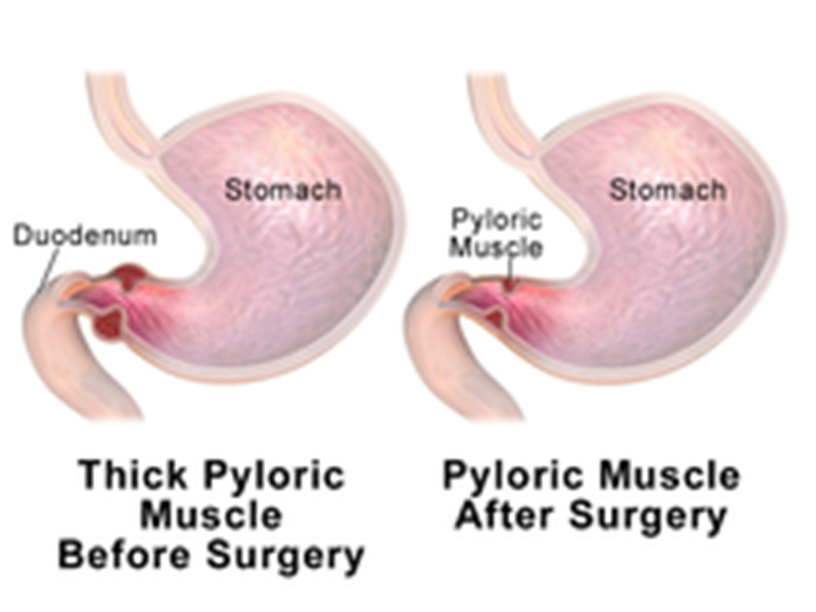A 6-week-old infant with poor weight gain is scheduled for a pyloromyotomy. Which pre-operative nursing action has the highest priority?
Mark an outline of the "olive-shaped" mass in the right epigastric area.
Maintain a continuous infusion of IV fluids per prescription.
Monitor amount of intake and infant's response to feedings.
Instruct parents regarding care of the incisional area.
The Correct Answer is B
Choice A reason: Marking an outline of the "olive-shaped" mass in the right epigastric area is not a priority nursing action. The mass is caused by hypertrophy of the pyloric sphincter, which obstructs gastric emptying and causes projectile vomiting. The mass may not be palpable in all cases.
Choice B reason: This is the correct answer because maintaining a continuous infusion of IV fluids per prescription is essential to prevent dehydration and electrolyte imbalance in the infant. The infant may have significant fluid loss due to vomiting and poor intake.

Choice C reason: Monitoring amount of intake and infant's response to feedings is important, but not the highest priority. The infant may have difficulty feeding due to nausea, vomiting, and abdominal pain.
Choice D reason: Instructing parents regarding care of the incisional area is a post-operative nursing action, not a pre-operative one. The parents will need to learn how to keep the incision clean and dry, monitor for signs of infection, and administer pain medication as prescribed.
Nursing Test Bank
Naxlex Comprehensive Predictor Exams
Related Questions
Correct Answer is ["B","C","D","F"]
Explanation
Choice A reason: Alcohol consumption will not produce vascular changes is incorrect information. Alcohol consumption can increase blood pressure by causing vasoconstriction, fluid retention, and interference with antihypertensive medications. The nurse should advise the client to limit alcohol intake to no more than one drink per day for women and two drinks per day for men.
Choice B reason: Sodium intake can be regulated by limiting canned foods in the diet is correct information. Sodium intake can increase blood pressure by causing fluid retention and increasing vascular resistance. The nurse should advise the client to limit sodium intake to no more than 2300 mg per day and avoid processed foods that are high in sodium, such as canned foods, soups, sauces, and snacks.
Choice C reason: Salt substitutes can help with maintaining a healthy diet is correct information. Salt substitutes can reduce sodium intake by replacing sodium chloride with potassium chloride or other minerals. The nurse should advise the client to use salt substitutes sparingly and consult with their healthcare provider before using them if they have kidney disease or take certain medications that affect potassium levels.
Choice D reason: Weight management is promoted by taking daily walks for thirty minutes is correct information. Weight management can lower blood pressure by reducing body fat, improving blood circulation, and enhancing insulin sensitivity. The nurse should advise the client to maintain a healthy weight and engage in moderate physical activity for at least 150 minutes per week.
Choice E reason: Blood pressure readings should be taken at noontime is incorrect information. Blood pressure readings should be taken at different times of the day, preferably in the morning and evening, to monitor fluctuations and trends. The nurse should advise the client to use a home blood pressure monitor that is accurate and calibrated and follow proper techniques for measuring blood pressure.
Choice F reason: Uncontrolled hypertension can lead to renal damage is correct information. Uncontrolled hypertension can damage the blood vessels in the kidneys, leading to reduced kidney function and chronic kidney disease. The nurse should advise the client to follow their prescribed treatment plan and monitor their blood pressure regularly.
Correct Answer is A
Explanation
Choice A reason: This is the correct answer because maintaining a quiet, non-stimulating environment is important to reduce agitation, anxiety, and hallucinations that may occur in clients with alcohol withdrawal delirium. Alcohol withdrawal delirium is a severe and potentially life-threatening condition that can cause confusion, disorientation, tremors, seizures, and autonomic instability.
Choice B reason: Forcing oral fluids and providing frequent small meals are not the most important interventions for a client with alcohol withdrawal delirium. Although hydration and nutrition are important to prevent dehydration and electrolyte imbalance, they are not the priority in this case. The client may have difficulty swallowing, vomiting, or aspiration due to altered mental status.
Choice C reason: Confronting the client's denial of substance abuse is not an appropriate intervention for a client with alcohol withdrawal delirium. The client may not be able to comprehend or respond rationally to such confrontation due to impaired cognition and perception. The nurse should avoid arguing or challenging the client's beliefs and focus on providing safety and comfort.
Choice D reason: Encouraging attendance and group participation is not a feasible intervention for a client with alcohol withdrawal delirium. The client may not be able to participate in any social or educational activities due to severe withdrawal symptoms and delusions. The nurse should limit visitors and stimuli and provide one-to-one supervision and reassurance.
Whether you are a student looking to ace your exams or a practicing nurse seeking to enhance your expertise , our nursing education contents will empower you with the confidence and competence to make a difference in the lives of patients and become a respected leader in the healthcare field.
Visit Naxlex, invest in your future and unlock endless possibilities with our unparalleled nursing education contents today
Report Wrong Answer on the Current Question
Do you disagree with the answer? If yes, what is your expected answer? Explain.
Kindly be descriptive with the issue you are facing.
